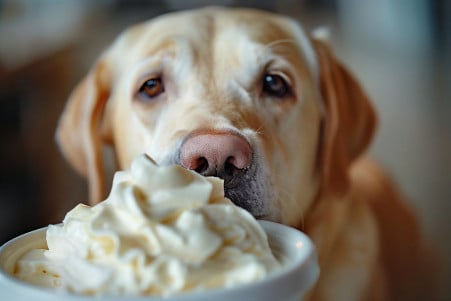Can Dogs Have Frozen Yogurt? Experts Explain the Pros and Cons
10 May 2024 • Updated 10 May 2024

If you’ve ever found yourself wondering whether or not you can share your frozen yogurt with your dog, you’re not alone. While there are some potential benefits to giving your dog frozen yogurt, there are also some risks. That said, dogs can have frozen yogurt in moderation as an occasional treat, but it’s important to make sure you’re giving them yogurt that’s made with ingredients that are safe for dogs and free of artificial sweeteners and added sugars. The best option is plain, low-fat yogurt, as too much dairy, sugar, and fat can lead to digestive upset in dogs.
That said, we referenced veterinarians who share their thoughts on whether or not dogs can have frozen yogurt without any negative side effects based on their knowledge of the topic. From the nutritional impact and digestibility of yogurt for dogs to the ingredients that can be toxic to dogs, we’ve got you covered with expert insights that will help you better understand how to safely give your dog frozen yogurt as a fun and healthy treat.
Can dogs eat frozen yogurt?
Healthy Frozen Yogurt Ingredients for Dogs
According to Pure Pet Food, plain, unsweetened yogurt is the healthiest option for dogs due to its lower lactose content and lack of artificial sweeteners and other potentially harmful additives. The American Kennel Club also recommends Greek yogurt, which has less sugar and more protein, which can help with digestion.
Yogurt that contains live cultures and probiotics can also be especially beneficial for dogs, helping to improve their digestion and immune system. One study cited by Pure Pet Food even found that the probiotics in yogurt can help with dogs' digestion. The AKC also explains that yogurt with live cultures is better for dogs.
Healthy mix-ins that are safe for dogs, such as peanut butter, berries, and watermelon, can be added to homemade frozen yogurt treats to make them more appealing and nutritious, as shown in recipes from Clover Sonoma, The Happiness in Health, and Brown Eyed Baker. However, it's important to steer clear of yogurt with added sugars, artificial sweeteners (like xylitol), chocolate, or vanilla extract, which can be toxic to dogs, according to Preventive Vet and Rover.
Portion Control and How Much to Give Dogs
Like any treat, frozen yogurt should be fed to dogs in moderation. It should not be a regular part of their diet. According to Yoghund, a cup of frozen yogurt a day is recommended by veterinarians to ensure the probiotic levels are high enough to benefit digestion and the immune system. Meanwhile, Purina says that yogurt treats should make up no more than 10% of a dog's daily calories.
The portion size of a frozen yogurt treat will depend on the size and weight of the dog, but it generally ranges from a few tablespoons to a small cup. It's also important to start with a small amount to make sure the dog doesn't have any digestive issues, especially if they are lactose intolerant. Nanci's Frozen Yogurt lists the portion size as 4 oz per cup and says that there are 16 servings per kit.
Many frozen yogurt products made for dogs will list the portion size and the number of calories in the product, which can help you determine how much to give your dog. However, it's important to make sure the product doesn't contain xylitol or other harmful ingredients, as we'll cover in the next section.
Xylitol and Other Harmful Ingredients to Look Out For
Xylitol, an artificial sweetener that is often used in many store-bought frozen yogurt options, is extremely toxic to dogs and can lead to fatal symptoms if consumed, according to Preventive Vet. Dogs should never be fed frozen yogurt or any other food that contains xylitol because even small amounts can be harmful. The ASPCA also states that xylitol is very toxic to dogs.
Other ingredients to avoid in frozen yogurt for dogs are chocolate, macadamia nuts, and some artificial sweeteners, according to Rover. Make sure to check the ingredients in store-bought frozen yogurt options before feeding them to your dog. If you want to be extra safe, you can make your own frozen yogurt treats at home using safe ingredients.
Probiotic Benefits of Frozen Yogurt for Dogs
Yogurt with live probiotic cultures can help dogs in a number of ways, from aiding in digestion and nutrient absorption, says The Wildest, to supporting the immune system and helping to fight off infections, including yeast infections, says The Honest Kitchen.
Since frozen yogurt dog treats are often made with yogurt that contains these probiotics, they can be a great way to make sure dogs get the probiotics they need in a fun and easy way. However, the amount of probiotics in yogurt may not be enough to make a difference, and in some cases, vets may recommend probiotic supplements or special dog foods, says Purina.
To make sure dogs get the most probiotic benefits from yogurt, it's important to make sure the yogurt used in frozen yogurt dog treats has live, active cultures and to store and handle the yogurt properly to keep the probiotics alive, according to ManyPets.
Conclusion: How to Choose the Right Frozen Yogurt for Your Dog
While the question of whether dogs can eat frozen yogurt doesn't have a simple yes or no answer, the general consensus is that plain frozen yogurt is safe for dogs to eat in moderation as a treat, according to DogTime. That said, some types of frozen yogurt, such as chocolate frozen yogurt, are toxic to dogs.
While most commercial frozen yogurts are made with dairy and refined sugar, which are not healthy for dogs in large quantities, a small amount of these ingredients is not toxic to dogs. However, many commercial frozen yogurts are sweetened with xylitol, an artificial sweetener that is highly toxic to dogs, even in small amounts.
The safest way to feed frozen yogurt to your dog is to buy or make a dog-friendly version, as suggested by Clean Eating Magazine, which means leaving out the dairy, added sugars, and artificial flavors. You can also make your dog a more dog-friendly frozen treat by freezing plain yogurt for them.
Frozen yogurts that contain xylitol as an ingredient are not safe for dogs, according to DogTime, and if your dog has ingested frozen yogurt with xylitol, you should take them to the vet immediately. In addition, some types of frozen yogurt, such as chocolate frozen yogurt, are toxic to dogs.


